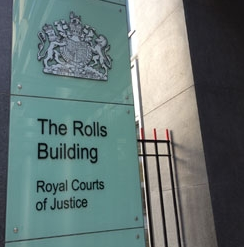Pro bono at City – Getting your money’s worth: the CO.IN experience

I would describe the atmosphere of the Winding Up Court in session, as a space where dozens of barristers, clients, and Litigants-in-Person (“LiPs”), are confined together like canned sardines, so that they may argue more than one hundred cases in the span of a single morning. It runs at a rapid-fire pace which boggles the mind, fires up the senses – and you will hear judges roar down “Adjournments” and “UCO’s” (i.e. the order to wind up a company) like highly educated, wig and gown wearing, auctioneers at a jurisprudential street-bazaar.
Well, in my experience, such a description would only constitute a slight embellishment.
Sounds fun, right? Trust me, it really is!
Is time spent in the Winding Up Court a little wild, a little wacky, a little whimsical? Sure.
Is it an enriching experience that will stand you in good stead for years to come? Definitely.

I have been fortunate to spend time in the lively Winding Up Court, in my capacity as a Pro Bono Volunteer and student member of the City Law School Company Insolvency (CO.IN) Scheme. The CO.IN Scheme was established at City Law School during the 2014/2015 academic year, by Senior Lecturer and Company Law Coordinator on the Bar Professional Training Course (“BPTC”), Ms Marian Riley-Poku. Operating from Consultation Room 17 on the 2nd floor of the Rolls Building, the CO.IN Scheme was given permission to commence by the Chancellor of the High Court in 2015.
The key aim of the CO.IN Scheme is to provide advice and legal representation to LiPs on a voluntary basis. Junior Barristers – drawn from prominent commercial chancery chambers such as Wilberforce Chambers, 4-5 Gray’s Inn Square, Lamb Chambers, 3 Paper Buildings, and South Square Chambers – advise and assist the LiP on a variety of insolvency law matters and procedures in the Winding Up Court, while the CO.IN Scheme’s student volunteers assist and observe the barristers in their duties. Since City Law School has licensed access rights granted by the Bar Standards Board, there is no need for an instructing solicitor, and volunteer barristers are instructed directly through the CO.IN Scheme itself. Critically, this means volunteer barristers are covered under their Bar Mutual insurance for work they do on the scheme.
Aiding LiPs firsthand and learning at the feet of established Barristers are invaluable opportunities to study and observe commercial practice in action. Additionally, and very conveniently, CO.IN volunteers quickly discover that they are picking up practical expertise in Conference Skills, Civil Litigation & Corporate Insolvency Procedure, and Ethics, while on the job; these skills translate extremely well into the course assessments on the BPTC (or BVS, as it may be), essentially giving you a “leg up” when it comes time to sit your final Bar course exams in these subjects.
Plus, volunteering with the CO.IN scheme looks great on your CV, too. If you have one eye on the pupillage recruitment round, spending time in the Winding Up Court is a brilliant way to gain practical experience, get a fresh perspective on what being a Barrister actually entails, and have tangible exposure to the Courts and legal system at large.
At first, before your initial volunteering day, it may appear as if volunteers on the CO.IN scheme play a relatively limited role. I myself, initially, had doubts, wondering if we as volunteers were nothing more than distant observers, staying out of the way as the volunteer barrister got down to the real job of helping the client; “simply” printing out the Winding Up list the day before, getting the client to sign the Consent Form, and filling out the Hearing Summary, certainly seemed like a minor role indeed.
My worries could not have been more unfounded!
On the contrary, after only one day in the Rolls Building’s Consultation Room 17, it rapidly becomes evident that the volunteers’ ability to acclimate the client, coax out the chronology of their case, and pick out key facts, goes a long way in making the volunteer barrister’s life much easier – allowing them to better help the clients. I was surprised, and heartened, to see that often the Volunteer Barrister’s first step, when engaging with a new client, was to inspect the Hearing Summary notes that had been written down by us volunteers.

In turn, regardless of what level you are with your Conference Skills, familiarity with the Ethics Code, and/or knowledge of court procedure may be, you are certain to improve and develop your skillset tremendously. For example, the first client my volunteering group met explained their case in a meandering, haphazard, manner; it was very difficult to follow! Immediately, upon entering Consultation Room 17, they pulled out a folder overflowing with various bank statements, email correspondences, website printouts, and handwritten records – which all promptly spilled on to the conference table, like a white-water cascade of paper, leaving us momentarily befuddled and overwhelmed.
Not the most promising of starts.
Slowly, systematically, and patiently – and patience was especially key here – we managed to extract what seemed to be the pertinent facts of the case. I was impressed by how a fellow volunteer, who had taken point, remained composed, even when the client went off on seemingly unrelated tangents when pressed for details on a certain point, shuffling the myriad of papers from their folder into an even more untenable jumble each time.
After a shaky start, we’d accomplished our task; the volunteer barrister went on to get the client an adjournment, for the exact period which they had desired.
To put into context how much we improved over the course of multiple volunteering sessions, whereas extracting the facts from one client seemed to be a nigh-Herculean effort our first time out, in our last volunteering session, the volunteer group was able to handle the cases of seven clients in a single morning, all of which were complex and multifaceted – including a returning client who was appearing for a nearly unprecedented 14th hearing in the Winding Up Court and had a backstory to their case history which nearly resembled a work of epic fiction.
We did it all without breaking a sweat.
Well, I may be exaggerating a bit. But, only a bit.

Ok, maybe it’s more than a bit. However, the improvement and experience gained through the span of our time volunteering on the CO.IN scheme was truly nothing short of awe-inspiring!
By now, I am certain you, the reader, are simply champing at the bit to go and sign up for the CO.IN scheme. Yet, I suppose it’s possible – much in the same manner I suppose it is possible that we have extraterrestrials living among us – that there are those of you who remain unconvinced.
Should you be amongst the ranks of the disbelieving, I will leave you with one final point.
As I mentioned above, the CO.IN scheme operates in team groups on volunteering days; what I did not mention, thus far, is that the camaraderie one forms with fellow volunteers is a real testament to how great the scheme is – I have developed lasting friendships with people I volunteered with in a group and had plenty of memorable moments that will endure. Along with all the wonderful positives I mentioned above, the opportunity to create friendships with great people you may not otherwise meet, is the final reason why I highly recommend volunteering on the CO.IN Scheme in the Winding Up Court.
Ready to sign up and take part? I figured. Well, you can apply to join the CO.IN Scheme by choosing the Bar Vocational Studies LLM (Clinical Legal Education) and remember to put the COIN scheme as your first choice.

I’m certain you’ll enjoy your time in the Winding Up Court.
Please say “Hi” to good ol’ Consultation Room 17 for me, as well, while you’re at it.
Many thanks to Darshbir Singh Chahal for this fascinating piece. Originally from the good ol’ US of A, Darshbir Singh Chahal attended the University of Edinburgh, graduating with an LLB (Honours) in Scots Law.
Completing the GDL at BPP University, he then underwent the BPTC/LLM at The City Law School. A student member of Middle Temple, Darshbir is also a Manchester United fan, an MMA enthusiast, and is inordinately fascinated with the Mongol Empire.
